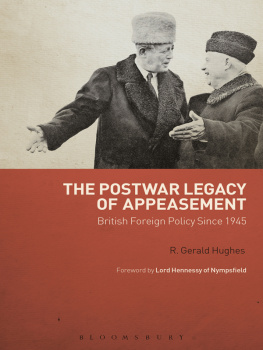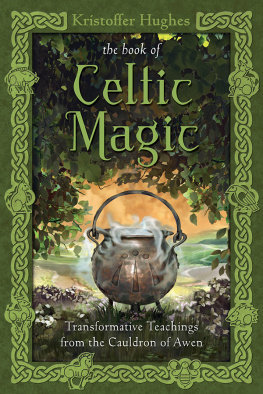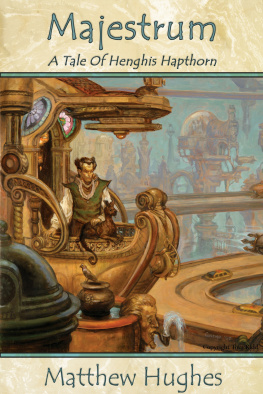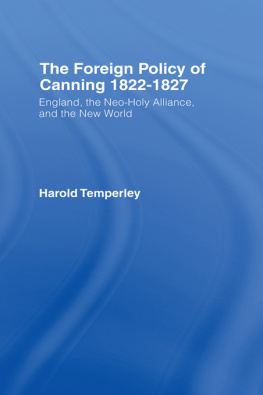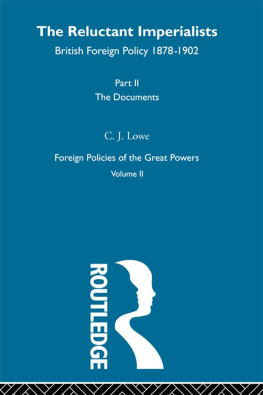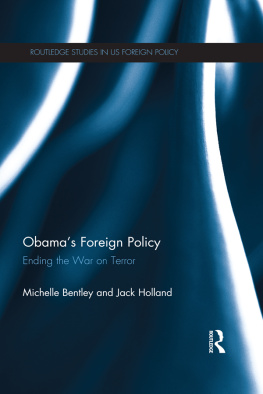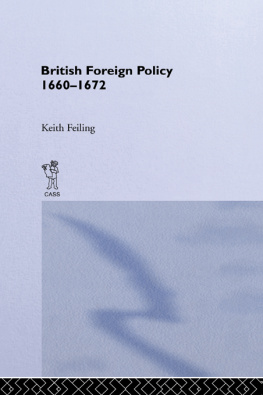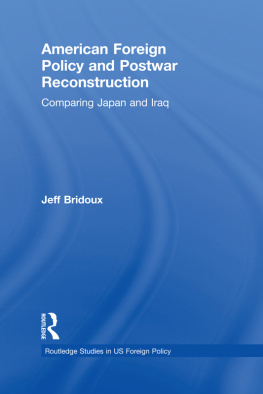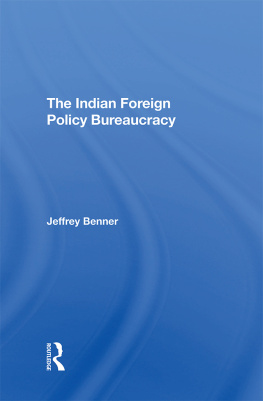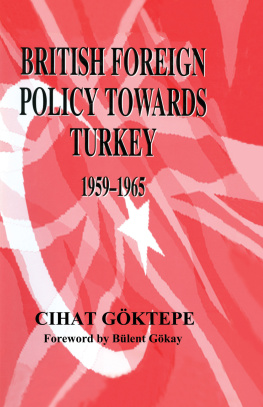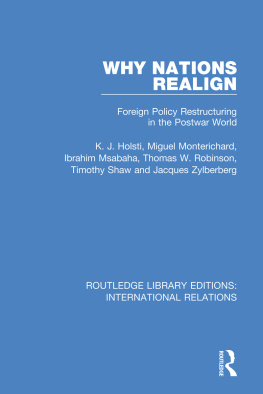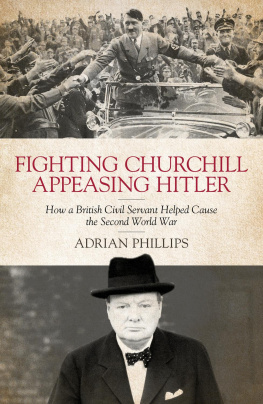Hughes - The postwar legacy of appeasement: British foreign policy since 1945
Here you can read online Hughes - The postwar legacy of appeasement: British foreign policy since 1945 full text of the book (entire story) in english for free. Download pdf and epub, get meaning, cover and reviews about this ebook. City: Great Britain, year: 2014;2013, publisher: Bloomsbury Publishing Plc, genre: Science. Description of the work, (preface) as well as reviews are available. Best literature library LitArk.com created for fans of good reading and offers a wide selection of genres:
Romance novel
Science fiction
Adventure
Detective
Science
History
Home and family
Prose
Art
Politics
Computer
Non-fiction
Religion
Business
Children
Humor
Choose a favorite category and find really read worthwhile books. Enjoy immersion in the world of imagination, feel the emotions of the characters or learn something new for yourself, make an fascinating discovery.
The postwar legacy of appeasement: British foreign policy since 1945: summary, description and annotation
We offer to read an annotation, description, summary or preface (depends on what the author of the book "The postwar legacy of appeasement: British foreign policy since 1945" wrote himself). If you haven't found the necessary information about the book — write in the comments, we will try to find it.
The postwar legacy of appeasement: British foreign policy since 1945 — read online for free the complete book (whole text) full work
Below is the text of the book, divided by pages. System saving the place of the last page read, allows you to conveniently read the book "The postwar legacy of appeasement: British foreign policy since 1945" online for free, without having to search again every time where you left off. Put a bookmark, and you can go to the page where you finished reading at any time.
Font size:
Interval:
Bookmark:
The Postwar
Legacy of
Appeasement
The Postwar Legacy of Appeasement
British Foreign Policy
Since 1945
R. GERALD HUGHES

I fy nheulu
Nolle timere
In international politics... you must either be ready to practice appeasement indefinitely, or at some point you must be ready to fight.
George Orwell, 1947
It will be enough for me... if these words of mine are judged useful by those who want to understand clearly the events which happened in the past and which (human nature being what it is) will, at some time or other and in much the same ways, be repeated in the future. My work is not a piece of writing designed to meet the taste of an immediate public, but was done to last forever.
Thucydides, The History of the Peloponnesian War
Maer hen delynau genid gynt,
Ynghrog ar gangaur helyg draw,
A gwaedd y bechgyn lond y gwynt,
Au gwaed yn gymysg efor glaw.
Hedd Wyn, Rhyfel
CONTENTS
I should like to thank all of the staff of the libraries and archives consulted during the preparation of this book. Great people all. I am especially grateful to the National Archives (Public Record Office) in Kew, which is a wonderful place, and to the Thatcher Foundation Archive at the Churchill Archives Centre in Cambridge. My thanks to Aberystwyth University for granting a period of leave that was very helpful in writing this book. Many thanks to Thomas Robb for his great assistance and advice in the preparation of this book. I have known Thomas since he was an undergraduate student of mine and I take great pride in his success. I should like to acknowledge the helpful advice of Len Scott. My very best wishes to my old mate Martin Alexander (a gent of the Old School). Thanks to Peter Jackson for his long-standing interest in my history. My sincere thanks to Peter Alan Lambert and Bjrn Udo Weiler for making their criticism of my history so much fun. I am grateful to Jan Ruzicka (Masaryk) for his knowledgeable insights Dkuji! Thanks to Whitelegg (aka Spear), Kris Lovell, Gregory Moore, Bobby Bayern Kammel and Oliver Dodd for their help. I am very grateful to Chikara Hashimoto (-!) for his assistance with the index. Thanks to Rhodri Mogford, Claire Lipscomb, Giles Herman at Bloomsbury for their professionalism and good humour; similar to Toby Hopkins at Corbis; and thanks to Srikanth Srinivasan at Newgen Imaging Systems for his hard work and for his unfailing patience. Best wishes to Gibson & Christine, Gegs (ac O2), Rab, Dav, Lindy, Babar, Tom Lewis, Owen K, Aled, Magnus Synge, Matt, Tony, Bryan (Mr. Lloyds friend), Terry John, Tom and Percy. Thanks to the Owain the Ozone and Simon for Friday lunches and laughter at the Rheidol. I have long appreciated the support of Toxy over the years Go raibh maith agat. My salutations to all my brothers and sisters at Bangor City FC; a happy hundredth to dear old Anglesey GC; and my best wishes and thanks to all my friends in Rhosneigr. Finally, my thanks to my family Arnie, Ma, Dave, Owen and Rachel for all of their support over the years. Hwyl i bawb!
The two words Munich and Appeasement are scored more deeply than any foreign policy concept into the Velcro of the national collective memory. Part stain, part shadow they lurk in the British consciousness ready to burst forth, floodlit, whenever a British government is confronted by the question of peace or war or even to intervene or not to intervene in circumstances short of war.
This is a book for which we have been waiting for years. R. Gerald Hughes is a consummate calibrator of the force and reach of the Munich/Appeasement spasm on the occasions it has pulsed through the national political conversation. Not for him what Edward Thompson called the enormous condescension of posterity. He judges each case on its merits and in the context of its own time. From his pen flows the sensitivity of the historian and the discipline of the international relations scholar.
In a rational world, any minister or parliamentarian itching to reach for the Munich analogy should pause, reach for Hughes on the bookshelf and think twice. This is a book of high utility and a real pleasure to read.
Lord Hennessy of Nympsfield, FBA
Attlee Professor of Contemporary British History
Queen Mary, University of London
On another occasion when the Emperor Alexander, referring to the King of Saxony, spoke bitterly of those who have betrayed the cause of Europe, Talleyrand replied with justice, that, Sire, is a question of dates.
ALFRED DUFF COOPER,Talleyrand
The day may come when my much cursed visit to Munich will be understood.
NEVILLE CHAMBERLAIN TO MARGOT ASQUITH, 11 May 1940
Chamberlain would have made a good Lord Mayor of Birmingham in a lean year.
LLOYD GEORGE
This is a book about the impact of one past upon another, more recent, past. It deals with how the framers of British foreign policy sought to negotiate and manipulate what are often crudely termed the lessons of history. The lessons I am referring to here are specifically those derived from the policies of appeasement employed by the British governments of the 1930s (during the premiership of Neville Chamberlain (19379) in particular). Many of the figures that feature in subsequent pages tried to learn from history or, more often, have sought to ensure that their view prevailed by invoking history. In the endless debates about the lessons of history, people are wont to fall back upon what Hegel wrote in 1837:
Rulers, Statesmen, Nations, are wont to be emphatically commended to the teaching which experience offers in history. But what experience and history teach is this that peoples and governments never have learned anything from history, or acted on principles deduced from it. Each period is involved in such peculiar circumstances, exhibits a condition of things so strictly idiosyncratic, that its conduct must be regulated by considerations connected with itself, and itself alone. Amid the pressure of great events, a general principle gives no help. It is useless to revert to similar circumstances in the Past. The pallid shades of memory struggle in vain with the life and freedom of the Present.
The widespread currency achieved by Hegels quote has never, alas, prevented the past being invoked by policy makers, historians, journalists and others to demonstrate the rectitude of a particular point of view or of a certain policy option. With regard to the present study, interpretations of the history of postwar British foreign policy are intimately associated with international relations between the two world wars, in what has come to be known as the era of appeasement. And yet appeasement, as famously argued by Paul Kennedy in 1976, was very much in line with earlier manifestations of British policy towards Europe.
In 1994, the historian and Conservative peer Lord Beloff was accused of impugning his political opponents motives by employing the word appeasement to describe them. Beloff replied that he did not regard the word appeasement as pejorative. After all, [a]ppeasement was used in the 1920s by those who wished to achieve a peaceful settlement at the time of Locarno, for instance. It is an honourable word. It means that you think that you cannot resist some external force which is too great and therefore you recommend getting the best deal possible. That alone says a great deal about the inflammatory and contested nature of a word whose dictionary definition had been so thoroughly subverted by historical developments.
Next pageFont size:
Interval:
Bookmark:
Similar books «The postwar legacy of appeasement: British foreign policy since 1945»
Look at similar books to The postwar legacy of appeasement: British foreign policy since 1945. We have selected literature similar in name and meaning in the hope of providing readers with more options to find new, interesting, not yet read works.
Discussion, reviews of the book The postwar legacy of appeasement: British foreign policy since 1945 and just readers' own opinions. Leave your comments, write what you think about the work, its meaning or the main characters. Specify what exactly you liked and what you didn't like, and why you think so.

